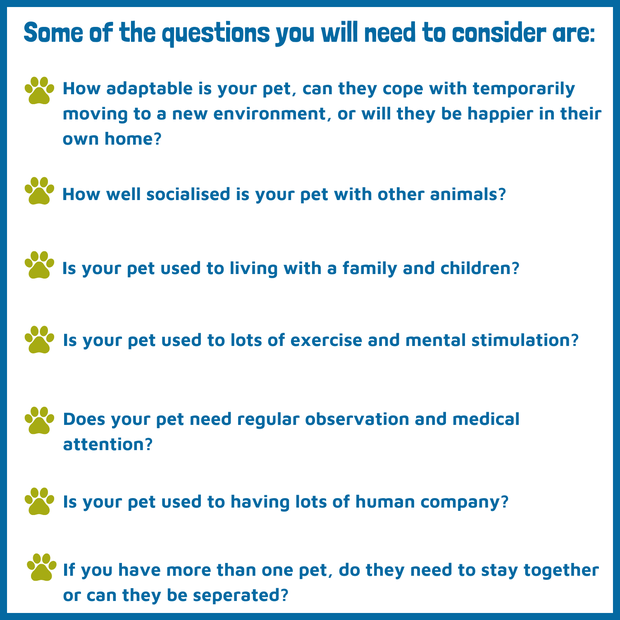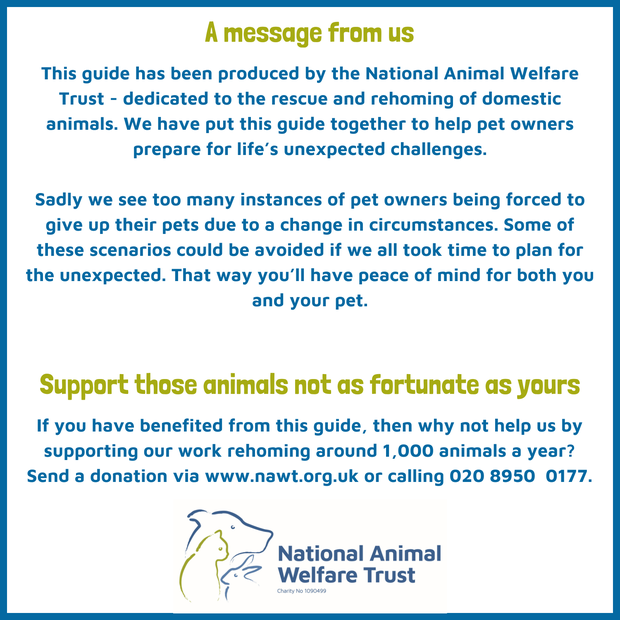Are you ready for the unexpected?
Introduction
Who else knows that your cat only likes to drink running water? Who else knows what your dog’s favourite toy is? Who else knows what your rabbit’s favourite vegetables are?
If you own a pet then the chances are that you have already got a friend, neighbour, or family member who is willing to care for your pet – even if it is just for the afternoon.
But what if you found yourself in a situation where the care was going to extend for days or even weeks? Would the same person be able to help, or would you need to make a more formal arrangement? Who would know all the details of your pet’s regular requirements, likes and dislikes?
At the National Animal Welfare Trust (NAWT) we know that the unexpected happens to pet owners daily and, like all other rescue centres, we don’t have the space to help everyone. Therefore, we have produced this guide to help you put together an easy-care plan for your pet. Whether it is for the short, medium, or long term to give you the peace of mind that if the unexpected happens, your pet will be safe and well cared for until you return home.
Choosing the right care option for your pet
Before even looking at which options are available, you need to think about your pets and their needs. Their age, species, breed, and specific health and behavioural requirements will have a bearing on the care option that is best for them.
Care options to consider
Once you have thought about your pet’s needs then it’s time to compare and consider the different options. There are many solutions available, and it is worth spending some time researching them before deciding on a plan. Make sure you discuss any thoughts or concerns with the people involved before finalising your decision.
If you have got insurance for your pet, now is a good time to familiarise yourself with your cover as it might have an influence on your choices. For example, some policies will cover your pets’ boarding fees if you spend time in hospital.
Your partner or family
Your partner and family members are often the first port of call, and rightly so, because they are often most local and know your pets reasonably well. However, in the event of a personal emergency they might also be needed to care for you – or even your family if you have children. It might be best to think of a plan B just in case they aren’t available.
While your family members probably know your pet reasonably well, it’s worth putting a list of information together for them, for example in case they have to take your pet to a vet. Our pet care forms can assist with that.
Family members might get on well with your pets, but if they have animals of their own, you will need to consider the impact of your pet moving into their house.
Friends and neighbours
Friends and neighbours will often step in to cover holidays or shorter-term care and can be a great help should the unexpected occur. But sometimes issues can crop up if your neighbours feel obliged to help even if it might not be ideal for them at that time. It’s always worth discussing your intentions with them to make sure they are happy to step in if there was ever the need. Again, it’s a good idea to talk through any impact caring for your pet might have on theirs.
Pet sitting
There are two types of paid-for pet sitting services. Either pet sitters stay in your home to look after your pet and your house, or your pet spends time being cared for in the pet sitter’s animal loving home. Pet sitting might be more suitable for those pets who really wouldn’t like to leave their own environment, or if you have more than one pet.
Home-from-home sitting can be a matched service in which details about your pet and its lifestyle will be used to find the best possible carers and location for them. This is more suitable for pets that would benefit from human company and those who would be more settled in a familiar routine.
You will find several services available locally. The best thing is to seek personal recommendations from other local pet owners and dog training clubs. Be sure to make contact and talk through your pet’s needs and how they could help. We would also recommend you meet your chosen pet sitter if possible.
Boarding kennels or cattery
Boarding kennels and catteries are an option for those pets who can handle being in an unfamiliar environment where there are lots of other animals. Most of our centres at NAWT offer a commercial boarding service to help us raise vital funds for the homeless animals in our care. Please give us a call if you’d like to hear more about this or head to our Pet Boarding page.
The advantages of boarding include onsite supervision, healthcare, plus any other resources that are available.
If you are planning to board your pet, then always ask for a tour of the premises. Check for cleanliness, staff friendliness, and attention to care plans.
Remember boarding establishments often get booked up in popular holiday times, so having a backup option is a good idea.
And lastly, do keep your pet’s vaccinations up to date as your pet may well be refused a place if it is not inoculated. This can include a kennel cough vaccine for dogs, so make sure to check in advance.
Other pet-friendly accommodation
It is a good idea to compile a list of places to stay where you and your pet would be welcome, in case of an event of something like flooding. This would be hotels and bed and breakfast accommodation.
Preparing your pet care plan
Once you have made your decision it’s time to look at assembling as much information as you can about your pet to have ready for your chosen carer. Make sure you are aware of the costs involved, so you can be prepared in the event of an emergency.
We have provided care forms for cats, dogs, and small animals (rabbits, guinea pigs, etc) that can be downloaded and filled in via the link below. Keep them in a safe place along with the vaccination certificates, microchip details, insurance policies, and any other relevant paperwork. You may also like to prepare a Pet Kit checklist, which will remind you of what items would make your pet’s stay away from home more familiar and comfortable.
We hope you never have to use it, but at least if something did happen, you’d have peace of mind that your pet was being well cared for until you return.


